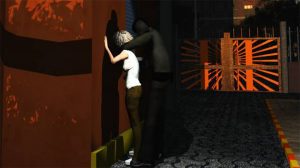I Feel Terrorized by the Parkinson’s Disease Thief
Written by |

I was working as a crisis clinician when the twin towers fell. My colleagues and I saw an increase in the number of people needing help with anxiety-related mental health issues. Sheldon Solomon, PhD, explained this phenomenon with his terror management theory – which is concerned with how humans manage threats to our survival, both real and imagined.
Parkinson’s disease (PD) threatens and terrorizes me. This “disease thief” invades my mind, body, and home — and there is nothing I can do to stop it. I live with the fear of knowing that it will show up each year and take something else from me.
This disease thief has taken my three careers: professional geologist/scientist, therapist, and professor. It took away my favorite hobby, rock collecting. I suffered significant losses of income, social networking, and personal identity. My careers represented a large part of how I saw myself in society. I retrained and now use a computer to continue my connection with my former careers. While it’s not the same as face-to-face, I’m using some of the skills I’ve acquired over the years so I can still teach. Yet, as I continue to reshape my identity, I fear the disease thief lurking in the shadows waiting to invade my life again.
In the past, I actively practiced being centered and calm. Until recently, I’d never felt terrorized or anxious, except for a short time in active combat in Vietnam. Stress has a way of exaggerating emotions, and life has been quite stressful over the past few years. We moved into a new home, had to leave our pets behind, and had trouble finding quality neurologists to treat the unique form of PD that I have. At one time, it looked like everything would fall apart. I felt that my survival was at risk.
The Parkinson’s Disease News Today forums are a place to connect with other patients, share tips and talk about the latest research. Check them out today!
I tend to feel things intensely; I cry at movies and feel other people’s pain as if it were my own. I am an empath, and I wrote my PhD dissertation on advanced levels of empathy. PD changes the emotional filters and alters the perception of reality connected to those emotions. It’s another aspect of scenario looping breakdown.
Dealing with the disease thief requires terror management.
Following are the steps I take:
1. With intense emotion, good or bad, stop and breathe.
2. Do not act on the emotion.
3. Do not spin in thought around the emotion.
I begin these steps as soon as possible after the emotion hits. If I wait too long, the risk of emotional dysfunction increases. If I do nothing, emotional noise will rush in to fill the void. I follow the steps with meditation. When I am calm, I can rationally examine the emotive events.
Being terrorized by the disease thief is one example of exaggerated emotions. Many situations produce emotions, and with PD, emotions are exaggerated. My quality of life is linked to my ability to manage my emotions. It is part of my rehab plan, which includes mental attentiveness, recognizing triggers, rest, exercise, and avoidance of particular foods or chemicals. With this plan in place, I’m ready to confront the disease thief.
***
Note: Parkinson’s News Today is strictly a news and information website about the disease. It does not provide medical advice, diagnosis or treatment. This content is not intended to be a substitute for professional medical advice, diagnosis, or treatment. Always seek the advice of your physician or another qualified health provider with any questions you may have regarding a medical condition. Never disregard professional medical advice or delay in seeking it because of something you have read on this website. The opinions expressed in this column are not those of Parkinson’s News Today or its parent company, Bionews Services, and are intended to spark discussion about issues pertaining to Parkinson’s disease.




Frank E Mundo
The word thief is exactly the right word. Steals in and takes away things that you always took for granted, but miss terribly when they are gone. You have little you can do.. try to recover and adjust with that part gone . . .
She comes uninvited into your life and spoils things. And she will be coming back again and again until there is nothing left of you
Dr. C
I am glad you like the thief analogy and also see that life with PD is a constant adjustment. The column also points out that it is easy to feel exaggerated emotions, like feeling as if there will be a time when "there is nothing left of you". While I acknowledge the emotional content of your experience the information I have read about the lives of people with PD (and my own experience) support the idea that people adjust, move on to do other things. I'm not saying all of this is easy. Heck no! It's damn hard work.
Derek Marshall
The other thief is the thief of time, which we all discover, sooner or later (rather later, I think). I am not sure how to handle that thief, but maybe Dr. C will have some advice...we all know that this thief is eventually going to win...
Dr. C
Interesting coincidence - partner and I were just talking about doing a column on PD and time management.
Corrie Trattner
Am a caregiver for a person with Parkinson's and deeply feel the thief in a lot of areas, time, relationship, loss of my awesome husband, things I thought we'd be able to do for the next 10 years and can't, etc. Would love to work with you on some of these issues. Maybe do some joint writing. I'm also an occupational therapist. I still work full time but I'm actively working on recrafting my life both in preparation for retirement but also to have a quality life for the caregiver as my husband's disease continues to progress and also go up and down in the iterim. Thanks so much,
Corrie ([email protected])
Dr. C
Thanks for the post Carrie. Feel free to contact me through www.DrC.life. Lots of different ways to do a joint writing project. The exchange of ideas can be mutually gratifying. I look forward to hearing from you. Be well.
Wonderful insight Dr. C. Thanks as always for your great perspective! And yes, I feel the PD thief is always lurking...
Dr. C
Thanks for your support. It is greatly appreciated.
Roy
From a Air Force pilot to a crippled, it all happen so fast, the Thief caught me blindsided. In light of which I wrote to my friend about the need to 'pitch one's tent and stretch out the sleeping bags before the sun goes down'.
https://www.youtube.com/watch?v=-8fEbmwp0EA
https://www.youtube.com/watch?v=DaEGVnNCSiA